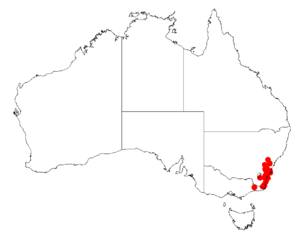Acacia subtilinervis facts for kids
Quick facts for kids Acacia subtilinervis |
|
|---|---|
| Scientific classification |
|
| Kingdom: | Plantae |
| Clade: | Tracheophytes |
| Clade: | Angiosperms |
| Clade: | Eudicots |
| Clade: | Rosids |
| Order: | Fabales |
| Family: | Fabaceae |
| Clade: | Mimosoideae |
| Genus: | Acacia |
| Species: |
A. subtilinervis
|
| Binomial name | |
| Acacia subtilinervis |
|
 |
|
| Occurrence data from AVH | |
| Script error: The function "autoWithCaption" does not exist. | |
Script error: No such module "Check for conflicting parameters".
Acacia subtilinervis, also known as the net-veined wattle, is a special and somewhat rare type of wattle tree. It belongs to a group of wattles called Juliflorae and is found in eastern Australia.
About the Net-Veined Wattle
This plant can grow as a tree or a shrub. It usually reaches a height of about 1 to 4 meters (3 to 13 feet). It can grow either spread out or stand upright.
Its bark is grey and can be smooth or have small cracks. The young branches are smooth and roundish. They can feel a bit sticky and become rougher towards their tips.
Like many wattles, it doesn't have true leaves. Instead, it has special flattened stems called phyllodes that look and act like leaves. These phyllodes are always green and feel leathery. They are long and narrow, usually straight, measuring about 5 to 15 centimeters (2 to 6 inches) long and 6 to 15 millimeters (about half an inch) wide. You'll see one main vein down the middle. There are also many tiny, thin veins that are hard to see.
Flowers and Seeds
The net-veined wattle blooms between August and October. Its flowers grow in groups called inflorescences. These flower groups appear alone or in pairs where the phyllodes meet the stem (called the axil). They grow on stalks that are 4 to 10 millimeters long.
The flower-heads are shaped like eggs or cylinders. They are 1 to 3 centimeters long and packed with bright yellow flowers.
After the flowers, seed pods form. These pods are straight and fairly flat. They are a bit raised and squeezed around each seed. The pods are firm but feel like paper. They are smooth or a little wrinkled, measuring 4 to 10 centimeters long and 3 to 4 millimeters wide. Inside, the seeds are lined up lengthwise. The seeds are black to brown, shaped like a long oval, and about 4 millimeters long. Each seed has a small, open ring-like mark.
How it Was Named
The net-veined wattle was first officially described by a botanist named Ferdinand von Mueller. He wrote about it in 1863 in his work called Fragmenta Phytographiae Australiae.
Later, in 2003, another botanist named Leslie Pedley reclassified it. He gave it the name Racosperma subtilinerve. But in 2006, it was moved back to the Acacia group.
The second part of its scientific name, subtilinervis, means "very fine veins." This refers to the tiny veins found in its phyllodes. The first plant specimen used to describe the species, called the type specimen, was collected by Ferdinand von Mueller. He found it in the hills around Mount Imlay.
Where it Grows
This wattle is found in two Australian states: New South Wales and Victoria. In New South Wales, you can find it around the Wolgan River in the northwest. It also grows along the coast near Nowra in the northeast.
Its range extends south into Victoria. It often grows among rocky areas. You can find it in heathland or dry sclerophyll forest communities. In Victoria, it grows as far south as the upper Snowy River in the eastern Gippsland area. It prefers sandy, gravelly soils, often near granite, sandstone, and rhyolite rocks.
 | Aaron Henry |
 | T. R. M. Howard |
 | Jesse Jackson |

